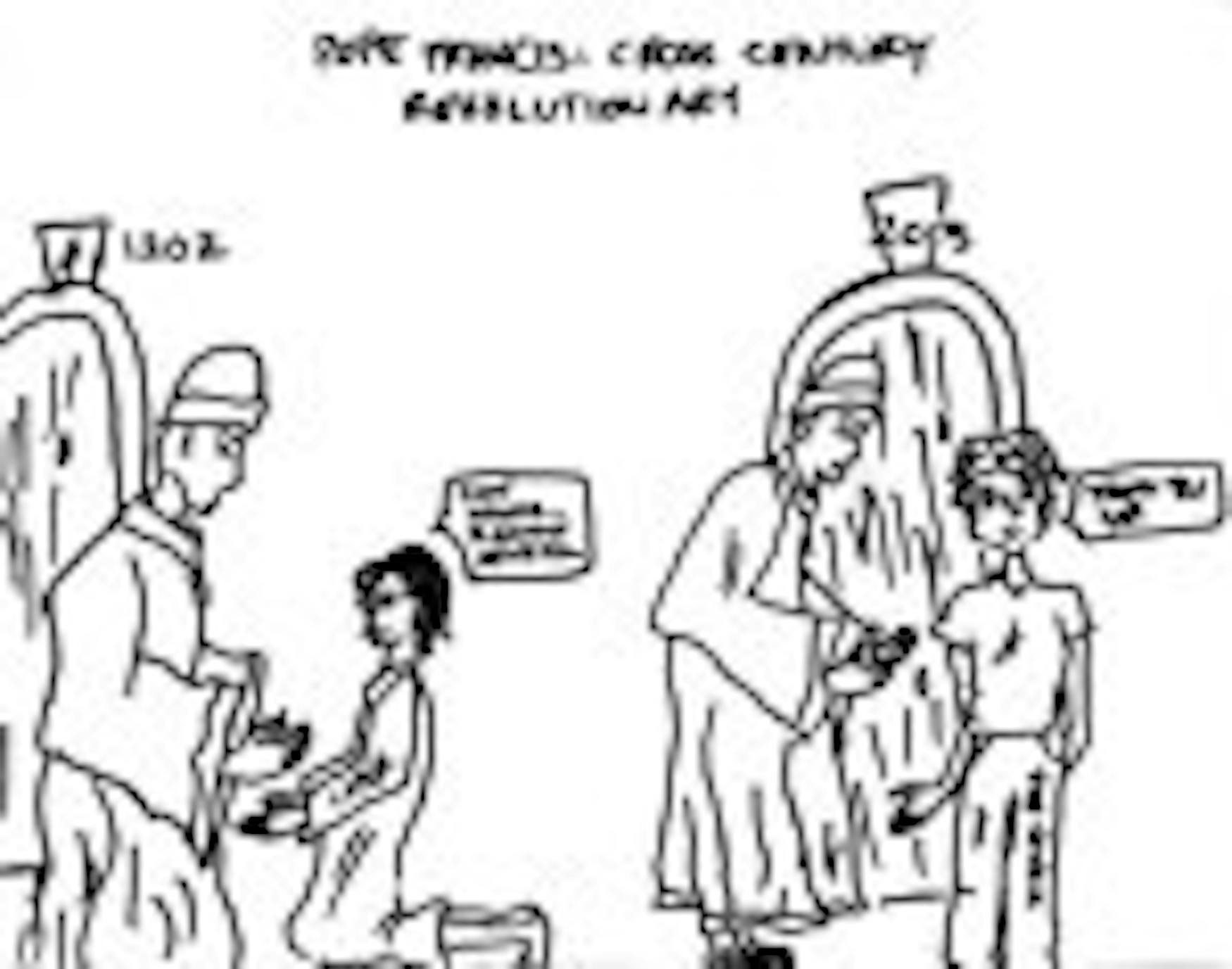Saint Francis was born in Assisi, Italy in 1181 or 1182. He was the son of a rich cloth merchant and enjoyed a carefree adolescence and youth. At age 20, he went to war and was taken prisoner for almost a year. After he was released, he became seriously ill, which marked the beginning of a new chapter in his life. When he returned to Assisi, Francis embraced his spirituality and detached himself from material concerns. He met with lepers and extended a kiss to one. In rags, he lived among beggars at St. Peter's Basilica in Rome. Francis' father questioned his son's generosity and servitude to the poor. While standing before the Bishop of Assisi, Francis stripped off his clothes and renounced his paternal inheritance, choosing to instead live as a hermit. In one famous episode, he went to the tattered small church of St. Damian, where Christ on the cross came to life and told him: "Go Francis, and repair my Church in ruins."
*
Former janitor, nightclub bouncer, chemical technician, and literature teacher Jorge Mario Bergoglio has not stripped naked (yet) but has acclimated to papacy with striking parallels to his namesake saint. Bergoglio is from Buenos Aires, Argentina, making him both the first South American and non-European pontiff. He's also the first Jesuit to be elected head of the Roman Catholic Church, and the third pope to be named Time Magazine's Person of the Year.
*
Where I grew up, organized religion was synonymous with discrimination and closed-mindedness. This held especially true for the Catholic Church. So when I heard about a new pope on my Facebook newsfeed, my initial reaction was skepticism-surely this was just another figurehead perpetuating the same hate that had always been associated with the church.
*
I couldn't have been more wrong. Pope Francis has entered the world stage as a down-to-earth man who follows the beliefs he preaches, who has acted as a role model for world leaders, and who has shown me that organized religion can be good, really good.
*
Unlike many world leaders, Pope Francis lives by the ideas he preaches. The Argentinian pontiff has kissed the head of a deformed man, washed the feet of a female prisoner in a ritual formerly restricted to men and even taken a "selfie" with some tourists. He drives a Ford Focus instead of the traditional pope's Mercedes, has shunned the spacious papal apartment in the Vatican's Apostolic Palace to live in a small suite in a Vatican guest house, and instructed Archibishop Konrad Krajewski, the man in charge of distributing money and food to the poor, to sell his desk and get out of the Vatican. "Don't wait for people to come ringing. You need to go out and look for the poor," Francis instructed. Poverty has been the biggest focus of Francis's papacy thus far, and he's made his dedication to it very clear.
*
In his first major document, "Evangelii Gaudium," he's labeled trickle-down economics theories as "a new tyranny" and as expressing "a crude and na??ve trust in the goodness of those wielding economic power." He's not the first pontiff to take such a stance on wealth inequality, but he's certainly one of the first to target it with such specificity and to uphold his preaching.
*
Many, including conservative radio host Rush Limbaugh, responded by attacking Francis's condemnation of trickle-down capitalism as "dramatically, embarrassingly, puzzlingly wrong" and as "pure Marxism." Francis responded, "Marxist ideology is wrong. But I have met many Marxists in my life who are good people, so I do not feel offended. There is nothing in the exhortation that cannot be found in the social doctrine of the Church." That roughly translates to, "I care about the poor not because I'm a Marxist, but because I'm a Christian."
To see a world leader, let alone the head of the Catholic Church, act in such a way has shaped the way I view both the Catholic Church and world leaders in general. Seeing the church set on a mission to help people who are in need, namely the poor, is revitalizing. Francis condemned the church as being formerly "locked up in small things, in small-minded rules." He added that "[w]e are about the healing mission of the church, not the theological police work that had maybe been preoccupying us ... I prefer a Church which is bruised, hurting, and dirty because it has been out on the streets, rather than a Church which is unhealthy from being confined and from clinging to its own security."
*
Francis recognizes that under the former pope, Benedict XVI, the church became overly focused on marriage and abortion. While Francis doesn't offer revolutionary ideas on these issues, his demonstrated efforts to help the poor serve as a constructive, rather than a destructive entity, which is exactly what this world needs.
*
My skepticism almost persuaded me into ignoring the news about the Pope altogether; I couldn't be happier that it didn't. Not only do I now have faith in the Church as an institution, I have faith in organized religion in general.




Please note All comments are eligible for publication in The Justice.